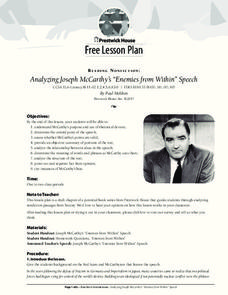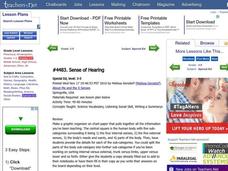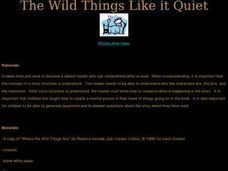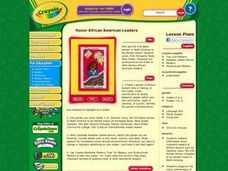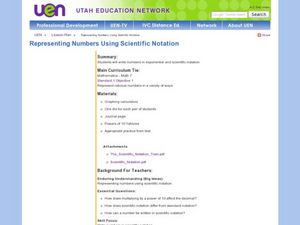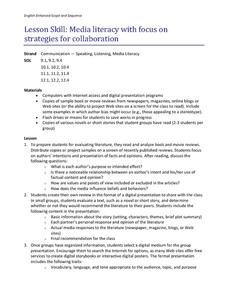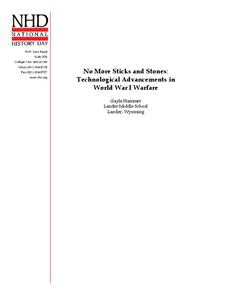Prestwick House
Reading Nonfiction: Analyzing Joseph McCarthy's "Enemies from Within" Speech
Looking for a instructional activity that teaches class members how to analyze nonfiction? Use Joseph McCarthy's famous "Enemies from Within" speech as a instructional text. Worksheet questions direct readers' attention to the many...
Curated OER
Sense of Hearing
Create a graphic organizer to review parts and systems of the body, then present a new topic. Special education students grades 3-5 learn about the sense of hearing. They draw parts of the ear, sign a song, read Perk Up Your Ears, and...
Curated OER
John and Mary Jones and the Importance of Oral History
Students examine the role of John and Mary Jones in the abolitionist movement. Using primary source documents, they discover the importance of an oral history and take notes on the Jones' role. They write a summary of the data to...
Curated OER
The Front Page: Asking Geographic Questions
Learners examine how to ask geographic questions. They read an article with details omitted, list possible geographic questions, and write a summary of the article.
Curated OER
Seasonal Changes
Students research seasonal changes and how they affect the environment. Completing a nature walk, they observe plants and animals and record the information in a graph. They also write summaries of the results of their research.
Curated OER
Enzyme and Southern Blotting
Students study southern blotting and its uses. They research on restriction enzymes and their uses, especially in relation to recombinant DNA. In addition, they write a summary and an interpretation of the gel.
Curated OER
Summarization Superstars
How do you read when you know you're going to be summarizing a text? Summarize a nonfiction text with your upper elementary schoolers. Your pupils independently read a nonfiction article and write a summary paragraph using the six-step...
Curated OER
The Wild Things Like it Quiet
Students read Where the Wild Things Are by Maurice Sendak. They visualize what is happening in the book and then identify the main points of the story. Students write a summary of the book and draw a picture of what they visualized...
Curated OER
What's the Big Deal?
Learners listen to a passage (suggested reading: "Do a Cat's Eyes Glow?") and create a map of what they hear. They use the map to write a summary. Then, they read their own passages and independently map and summarize it the same way....
Curated OER
Fairytale Fabrics
Students read fairy tales and folk tales and discuss the facts of each story. After reading their favorite story, they create original illustrations on heavy fabric or canvas using fabric markets. Students depict as many scenes as...
Curated OER
Honor African American Leaders
Students research people of African descent, identify the person's achievements and contributions made to society. Afterward, they draw a sketch of the person researched, and write a summary of their findings. Students include important...
Curated OER
What Do You Do?
People play all sorts of roles during their lifetimes. Learners interview three adults about the role they play most and, what type of lifestyle they feel they have. Kids then write summaries of their interviews, focusing on what role...
Curated OER
Representing Numbers Using Scientific Notation
Learners explore the concept of scientific notation. In this scientific notation lesson, mathematicians discuss how multiplying by a power of 10 affects the decimal. They play Powers of 10 Yahtzee. Students roll a die five times and each...
Curated OER
What are the 13th,14th, and 15th Amendments?
The 13th, 14th, and 15th Amendments are outlined in this PowerPoint. Each amendment is noted on its own slide, with a summary of its purpose and important sections of the actual document. Tip: Have students choose an amendment and write...
Curated OER
San Agustin y La Florida
Read about San Agustin, Florida, and the Spanish influence on the American city during the 1500's. The text itself is five paragraphs long, and there is a bolded list of words that the reader needs to place correctly in the text. To...
English Enhanced Scope and Sequence
Media Literacy with Focus of Strategies for Collaboration
Introduce your class to literary analysis with a series of activities that has them examine book and movie reviews. Groups then draft their own review of a text, select a digital medium, and craft a presentation.
Alabama Department of Archives and History
Strange Fruit: Lynching in America
To continue their study of the Civil War, Reconstruction, and the beginning of the civil rights movement, class members watch the YouTube video of Billie Holiday singing "Strange Fruit" as an introduction to an examination of lynching in...
American Chemical Society
Finding Volume: The Water Displacement Method
We have formulas for finding the volume of geometric shapes, but what if the shape is irregular? Lesson describes how to find volume through water displacement. After a demonstration, scholars practice in small groups. Then analysis...
American Chemical Society
What is Density?
Density: the reason a giant pumpkin will float, but a tiny cranberry won't. Lesson begins with a demonstration of two of the same-sized cubes having different densities. Then pupils take eight cubes, each of the same size, and have to...
American Chemical Society
Temperature Changes in Dissolving
Alia-Seltzer tablets cause a very obvious chemical change, but do they also cause a temperature change? Each class member explores hot/cold packs, discussing how these temperature changes occur. Groups then design and carry out their own...
University of Georgia
Energy Content of Foods
Why do athletes load up on carbohydrates the evening before a competition? The lesson helps answer this question as it relates the type of food to the amount of energy it contains. After a discussion, scholars perform an experiment to...
Columbus City Schools
To Measure its Mass or Volume?
Atoms, elements, and molecules, oh my! Teaching the fundamentals of chemistry to curious sixth graders has never been easier to accomplish. Here is a resource that pulls together everything needed to get them off to a good start,...
National History Day
No More Sticks and Stones: Technological Advancements in World War I Warfare
Remind young historians that many technological advancements influenced the events of World War I. After analyzing technology's evolution through primary sources, discussing the changes over time, and watching various video clips,...
Curated OER
Reducing Volcanic Hazards to People and Property
Students examine and research major hazards to humans located in the area of volcanoes and write a general summary. Students must choose a volcano and determine what actions might be taken to reduce risks to a population. Summaries are...
Other popular searches
- Writing a Summary
- Writing a Summary Paragraph
- 4th Grade Writing Summary
- Writing a Chapter Summary
- Summary Writing Powerpoint
- Writing Summary
- Nonfiction Summary Writing
- Teaching Summary Writing
- Writing a Book Summary
- Chapter Summary Writing
- Writing a Summary "Esl"
- Summary Writing Activities


